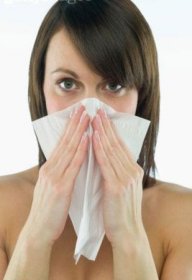-
(单词翻译:双击或拖选)
Sleep On,Sneeze Not
睡觉的时候不会打喷嚏
The signs are unmistakable: the eyes water, the chest heaves, the nose twitches, the body tenses, suspense builds until finally a sneeze blasts forth1, concluding the drama. It's a momentarily paralyzing experience that can seize one at almost any time.
But try and recall if you've ever been jarred out of a peaceful sleep by an explosive sneeze. Chances are you can't, because, thankfully, we don't sneeze while we sleep. To understand why, first we need to know why we sneeze while we’re awake.
Sneezing is a reflex, which means that it's an uncontrollable physical response to an outside stimulus2. When something, say a piece of dust or a strong odor, stimulates3 nerve endings in the lining of the nose, the stimulus travels to the central nervous system and is then routed back to the muscles of the face, throat, and chest.
Once stimulated4, these muscles go to work and cause us to forcefully expel air from the mouth and nose. Or, in other words, we sneeze.
Because the nose lining tends to swell5 when we lie down, making it even more sensitive to sneeze-causing particles, it would seem that sneezing would be likely during sleep.
However, since there is little airflow in most bedrooms at night, and little movement to stir up dust and other particles, the nose is not bombarded by as many foreign particles as it is during the day.
Furthermore, the area of the brain responsible for the sneeze reflex relaxes while we sleep. So, even when a particle does touch the nose lining, the brain doesn't notice, and we don't sneeze.
眼睛湿润,胸部隆起,鼻子一阵抽搐,身体紧绷,(身体)就这样待定着,到最后一个喷嚏响起,像是演了一出戏剧!这使得人的身体短暂麻痹,它几乎可以在任何时间让一个人给紧缩。
但是,试想你曾经有过在安详的睡眠中被一个突然的喷嚏给震醒的情况吗? 你是不会有的,因为很庆幸,我们在睡觉的时候不会打喷嚏。要理解其原因,我们首先需要了解为什么我们会在醒的时候打喷嚏。
打喷嚏是一种反射,也就是说它是一种生理对外界环境的反应,不可控制。有时候,像一颗尘埃或一股强烈的味道刺激了鼻子里的神经末梢,这个刺激就会到达中枢神经系统,继而再返回到脸部、喉咙和胸部的肌肉。
这些肌肉一旦被刺激,它们就会运动,导致我们强有力的排出口腔和鼻子里面的空气。或者,换句话说就是打喷嚏。
因为在我们躺下的时候,鼻子里面部分趋于隆起,这使得它对引起打喷嚏的微小颗粒更加敏感。这样看来,似乎在睡觉的时候更容易打喷嚏。
然而,由于我们的卧房里在晚上几乎没有空气流动,也没有什么运动会扬起灰尘及其它微粒,所以就不会有像白天那么多外界微粒来刺激我们的鼻子。
而且,当我们睡觉的时候,脑袋中负责打喷嚏反射的区域也休息了。所以,即使有微尘碰触了鼻子内部,大脑也没意识到,我们就不会打喷嚏。
 收听单词发音
收听单词发音
1
forth

|
|
| adv.向前;向外,往外 | |
参考例句: |
|
|
|
2
stimulus

|
|
| n.刺激,刺激物,促进因素,引起兴奋的事物 | |
参考例句: |
|
|
|
3
stimulates

|
|
| v.刺激( stimulate的第三人称单数 );激励;使兴奋;起兴奋作用,起刺激作用,起促进作用 | |
参考例句: |
|
|
|
4
stimulated

|
|
| a.刺激的 | |
参考例句: |
|
|
|
5
swell

|
|
| vi.膨胀,肿胀;增长,增强 | |
参考例句: |
|
|
|


















